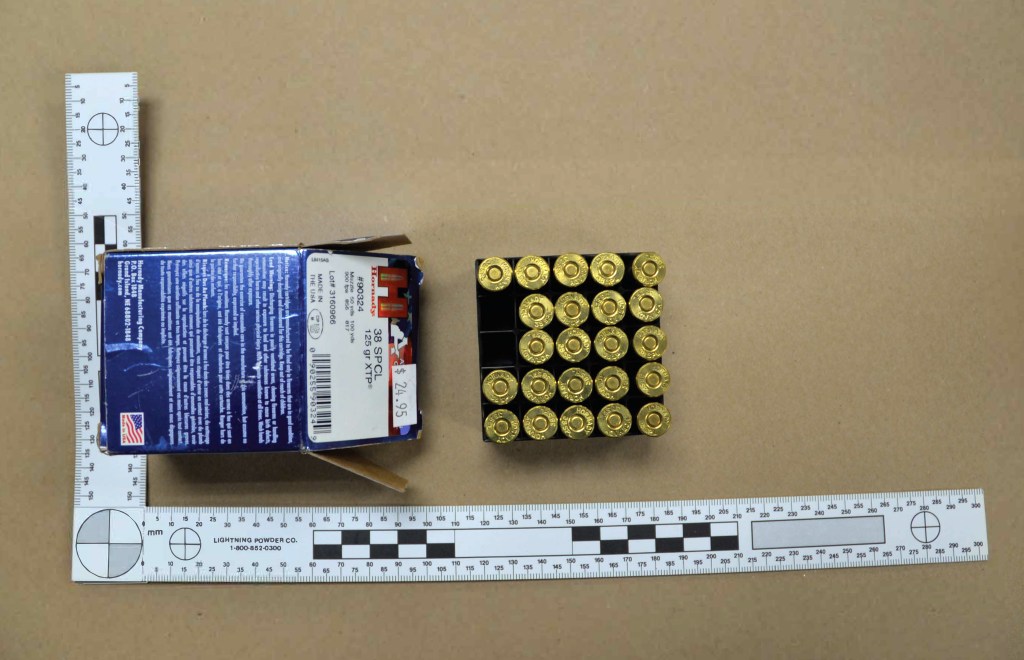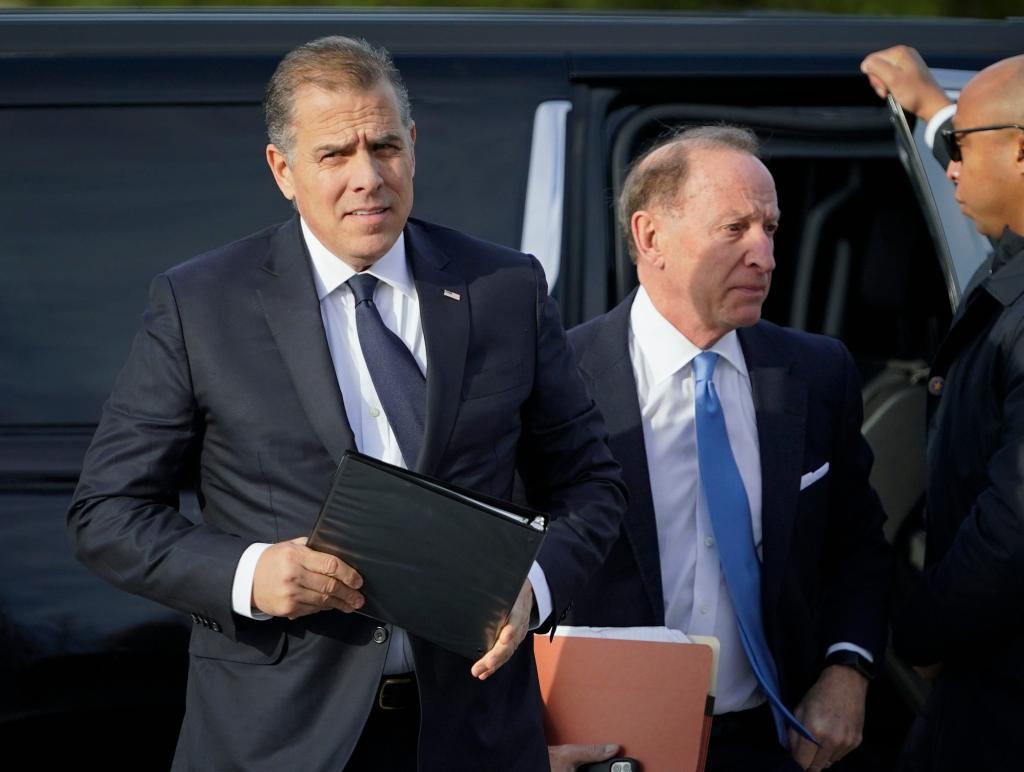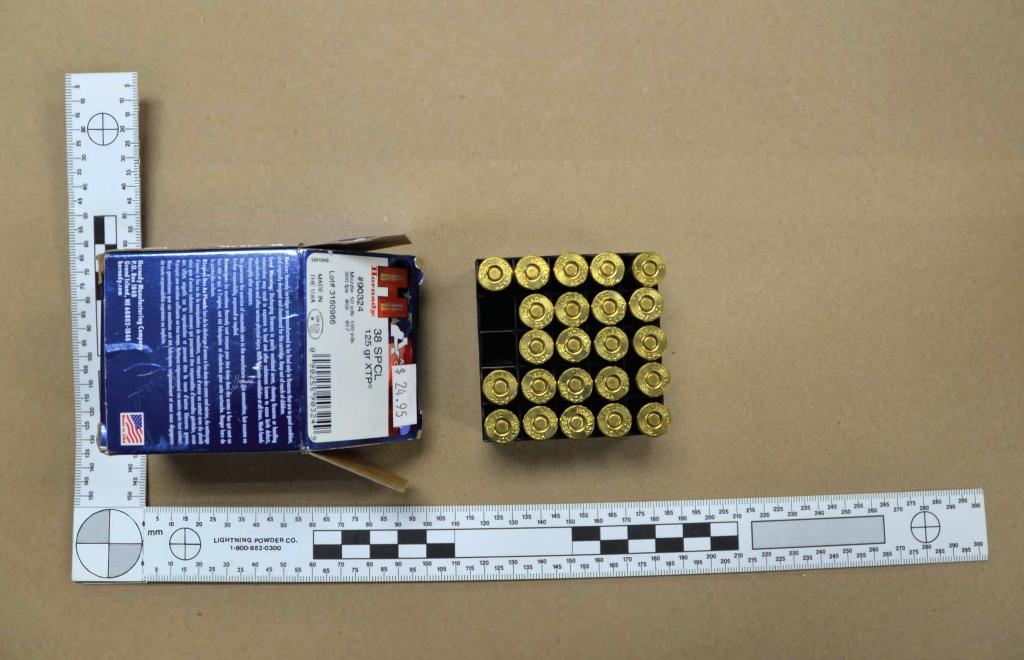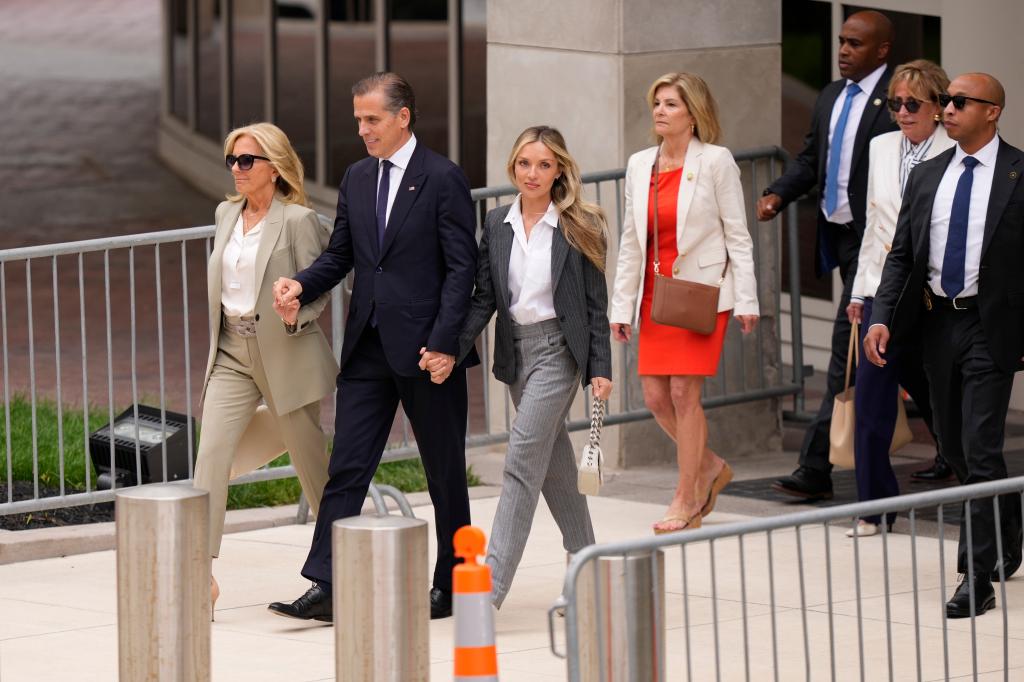Key moments in Hunter Biden trial: Defense faced critical blows
WILMINGTON, Delaware — Hunter Biden’s lawyers aimed to sow doubt throughout his firearms trial about the timeline of his addiction, but the defense made crucial mistakes during the proceedings that ultimately led to his swift conviction Tuesday.
Hunter’s lead attorney Abbe Lowell didn’t have to prove definitively that the first son wasn’t a cocaine addict or that he didn’t knowingly lie when he purchased the firearm — only that there was reasonable doubt that this was the case.
But Lowell struggled to disprove the timeline laid out by prosecutors — and in one particularly brutal moment on the third day of the trial, he garnered chuckles from prosecutors Derek Hines and Leo Wise as he attempted to poke holes in salesman Gordon Cleveland’s story.
These struggles, along with prosecutors’ quick rebuttals of the defense at every turn, resulted in the jury reaching a guilty verdict after only three hours of deliberation.
Here’s a look at some of the setbacks that mattered the most:
Timeline of addiction
From the onset of his opening arguments, Lowell warned jurors that large swaths of the evidence prosecutors unearthed stemmed from happenings before and after the Oct. 12–23, 2018, period Hunter possessed the .38-caliber revolver.
Lowell underscored how Hunter had received treatment at The View, a California rehab facility, in August of that year.
At first, prosecutors appeared to play into his hands Tuesday by unfurling evidence largely via Hines’ questioning of FBI Special Agent Erika Jensen, their first witness, that predominantly dealt with the timeframe before and after October 2018.
This included evidence from Hunter’s book, “Beautiful Things,” and scores of his messages.
There were two main messages prosecutors flagged pertaining to the time when Hunter had possession of the firearm, in which there were apparent references to his not-so-secret drug life.
First was a text to “Mookie” the day after his gun purchase — in what prosecutors suggested was a drug deal. Second was a text on Oct. 14, 2018, in which he said, “I was sleeping on a car smoking crack.”
One day after purchasing his gun on Oct. 12, 2018, Hunter Biden sets up a drug deal with "Mookie" at the 7/11 on Greenhill and Lancaster.
— Andrew Kerr (@AndrewKerrNC) June 3, 2024
"He has my money mad I'm getting pissed," Hunter texts Hallie Biden. pic.twitter.com/U6r4pp2biv
But the bulk of the material that prosecutors initially delved through regarding his cocaine use did not apply to that October timeframe.
Then Hunter’s old flame Zoe Kestan took the stand.
Start and end your day informed with our newsletters
Morning Report and Evening Update: Your source for today's top stories
Thanks for signing up!
“Yes,” she replied when asked if she saw Hunter smoking crack during their meetup on Sept. 17, 2018 — after his rehab stint.
Hunter fessed up in his book to relapsing about two weeks after rehab, but Lowell had previously stressed that investigators couldn’t be 100% certain whether he was talking about a return to drugs or alcohol.
Kestan undercut that narrative he was trying to build.
Still, Lowell managed to impress upon jurors that Kestan did not have any in-person interactions with Hunter during the October period in question.
“For most of October, he was unresponsive to me,” she said. Though, by the following month, Hunter reached out again, saying he was “depressed” and eager to see her.
Hunter’s sister-in-law-turned-lover at the time, Hallie Biden, later took the stand and revealed that she too hadn’t seen him actually smoke crack during the October timeframe in question. However, she did testify that the truck where she discovered the .38-caliber revolver on Oct. 23, 2018, also had crack paraphernalia in it at the time.
Lowell’s fixation on the timeline was dealt another huge blow when he called up Hunter’s eldest daughter, Naomi Biden, to testify. She said under oath that she returned the truck to her father on Oct. 19, 2018, and that it was clean of crack paraphernalia when she did so.
“There is no requirement that the United States prove [crack] use in the month of October,” Wise underscored in his closing arguments, arguing that he believed it did anyway.
Naomi Biden’s testimony backfires
All week, Hunter’s defense team toiled to find and expose some sort of weakness in the prosecutors’ damning narrative about the first son. Then they called Naomi to the stand.
“The reason I think she was called was to suggest he was OK,” Wise later surmised.
“This is not OK,” he said, pointing to Hunter’s texts to her at 2 a.m. demanding his truck back.
Dressed in black, she was very timid on the stand. “Sorry, I’m nervous,” she said at one point. Lowell later got her water and was very gentle in his questioning.
“He seemed like the cleanest I’d seen him since my uncle died,” Naomi recounted about her father after his August 2018 rehab stint. “I told him that I was so proud of him.”
With Lowell’s guidance, Naomi painted her father in a rosy way and denied any whiff of an indication that he was in the throes of a crack addiction at the time he purchased the revolver that October — at least from her vantage point.
Then Wise stood up to question her. Armed with a packet of text messages that Lowell later groused over, he peppered her with questions, immediately making clear that she wasn’t privy to a lot of her father’s drug dealings.
“I knew when he was struggling. I didn’t see him. We didn’t communicate,” she explained about her father’s addiction, admitting she probably wouldn’t have known when he was using. “After my uncle died, things got bad.”
Her testimony only got worse from there.
Wise — who, in his softer voice relative to Hines’ deep vocal chords, questioned most of the key female witnesses — ran through the October timeline with her.
She had told Lowell about borrowing her father’s truck to help move Peter Neal (now her husband, who was present in the courtroom for all this) into a new apartment in New York. She briefly saw her dad at the time and described him as “hopeful.”
Naomi explained that there was no drug paraphernalia in the car at the time. (Her mother previously testified about cleaning the cars out so that the kids wouldn’t be driving with drugs.) But Wise zeroed in on Hunter’s efforts to retrieve the truck.
He revealed that Hunter reached out around Oct. 17, 2018, and texted her late at night, seeking to get the truck back.
“Do you know what your father was doing at 2 o’clock in the morning and why he was asking for the car then?” Wise asked. She didn’t know.
“Did he tell you he was meeting with someone named Frankie?” he later asked. She said no.
Frankie is the name of a drug dealer, according to Kestan’s prior testimony. The text messages Wise read painted a picture of Hunter being flaky with Naomi and ghosting her at times.
“I’m really sorry dad, I can’t take this. I don’t know what to say. I just miss you and want to hang out with you,” she later texted Hunter, according to Wise.
“I’m sorry I’ve been so unreachable, it’s not fair to you,” Hunter replied, per Wise.
Naomi’s voice crackled at times and almost sounded a little panicky. Hunter was seen wiping tears from his eyes as he watched his daughter on the stand. She hugged him on the way out and appeared to wipe a tear from one of her eyes at the end as well.
Lowell suggests Hunter is a liar
Lowell attempted to explain that the text about “sleeping on a car smoking crack” was intended to turn the recipient — Hallie — away.
“He would lie to her about where he was and that would certainly include when he was with another woman,” Lowell contended during his closing arguments.
Follow the latest on Hunter Biden’s federal gun trial:
- Hunter Biden guilty of felony gun charges, faces 25 years in prison
- Joe Biden reveals whether he will pardon Hunter after first son convicted on felony gun charges in first comments since verdict
- Hunter Biden breaks silence after felony gun conviction, says he’s ‘disappointed’ by outcome
- Hunter Biden juror reveals the damning evidence that lead to conviction at gun trial
- Here’s what’s next for Hunter Biden following his conviction on gun charges
Prosecutors countered that if Hunter didn’t want Hallie to know his whereabouts, he didn’t have to tell her in that text exchange that he was in Delaware.
“Crack is crack,” Hines quipped during the trial at one point about that text.
“They literally want you to believe the defendant was a lair,” Hines later chided during his closing arguments. “Believe his words.”
Was Hunter really behaving like a crackhead?
Another narrative Lowell briefly tried to introduce was the idea that Hunter had considerable responsibilities that he had to juggle around October 2018
“There may be high-functioning alcoholics, but there is no such thing as high-functioning crack addicts,” Lowell said Tuesday, listing several cushy gigs Hunter was working at the time.
On Wednesday, two of Hunter’s former lovers, his ex-wife Kathleen Buhle and old flame Kestan, seemingly threw cold water on that.
“I thought to myself, ‘It’s crazy his demeanor doesn’t seem to be changing,’” Kestan recalled about Hunter’s crack use. “I never saw an immediate change in his behavior, which really confused me.”
Buhle, who seemed as though she clearly did not want to be in that courtroom, did recall that at times, Hunter “was not himself” during the throes of his addiction.
However, she later suggested that he had been at least somewhat functional on crack and was able to engage with friends and family throughout it.
Lowell had tried to undercut her, by exposing how the two began living separately around the summer of 2015. Notably, Kestan would’ve had more of an upfront view of Hunter’s alleged crack splurge closer to the timeframe in question.
Adding insult to injury, Wise wrapped up his questioning of Kestan by asking her the age she was at the time, which was 24. Then he asked for Hunter’s age.
“Twice my age, so 48,” she replied.
Hallie later corroborated Hunter’s functionality, saying, “It wasn’t always consistent. Agitated, high-strung.”
“But other times … he was functional as well.”
Cash withdrawals
On Tuesday, prosecutors noted that on one account, Hunter withdrew some $151,640.45 from September to November 2018 — roughly $50K a month. Then on another, he had withdrawn about $3.4 million that entire year.
On the day of the gun purchase, Hunter had withdrawn about $5,000, according to Hines.
Lowell shot back at this by noting that Hunter was without a credit card. Book passages played by Hines showed him claiming to have often lost credit cards on drug-related escapades.
The defense attorney also stressed during his rounds of questioning with Jensen that prosecutors were not detailing how Hunter was actually spending the money from his bank account.
Lowell highlighted how Hunter once tapped his bank account to purchase liquor and insinuated that his cash withdrawals could’ve been used to help friends and family and tend to run-of-the-mill purchases.
Hines used his follow-ups with Jensen Wednesday morning to rebut that, to explain that Hunter tapped his bank account in two main ways — first via his ATM card for purchases such as alcohol from the liquor store, and second via cash withdrawals from something else.
“Liquor stores accept check cards, Visa cards,” Hines quipped. “Do drug dealers accept cards?”
“Not in my experience,” Jensen replied.
‘Knowlingly’ lied
Another argument Lowell attempted is that prosecutors lacked evidence that Hunter “knowingly” lied on the form to purchase the firearm.
He briefly suggested that Hunter was in a “deep state of denial” for a time and repeatedly tried to cast doubt as to whether his client was an actual drug addict during that 11-day stretch when he had the handgun.
Yet at one point, Kestan recalled Hunter telling her in the latter half of 2018, “No matter how long you are sober, you will always be an addict.”
Moreover, Cleveland maintained that Hunter did not give any hint of a suggestion that he didn’t know the implications of what he was signing on the ATF Form 4473.
Pushy salesman
Lowell was eager to dredge up how Cleveland’s old co-workers described him as a “whale hunter” due to his reputation for selling more high-end firearms.
“I wouldn’t sell junk,” Cleveland explained, contending that he tried to sell what he would want to buy.
Cleveland has been a trash truck driver for over a decade and did a brief stint at the StarQuest Shooters & Survival Supply, so he could rake in more dough to afford more guns, as he described.
Start and end your day informed with our newsletters
Morning Report and Evening Update: Your source for today's top stories
Thanks for signing up!
He recounted in great detail how Hunter Biden entered the store and sought a firearm — rejecting any insinuation from Lowell that he pushed it on the future first son.
When questioned about how Hunter paid, Cleveland recounted that he gave about $900 in cash and told him to keep the change on the $886.81 payment.
Rather than pocketing it, Cleveland recalled putting that extra change in an envelope at the store. He also denied that salespeople got a commission at the store.
Hunter was just an alcoholic
Lowell had seized on passages in Hunter’s book to paint a picture of Hunter being an alcoholic. His thinking appeared to be that alcoholics are not necessarily included in the question about whether a patron is “addicted to marijuana or any depressant, stimulant, narcotic drug, or any other controlled substance.”
The defense attorney highlighted eight of Hunter’s purchases at liquor stores during the October time period surrounding the gun incident. He also fussed over Hunter’s use of the term “relapse” in his book — suggesting it could’ve been a reference to alcohol, not crack.
But Hunter’s two former lovers made clear that he was doing both.
Funny business with the ATF form
During his opening arguments, Lowell hinted at gripes with the ATF form and the fact that it had three different colored inks and three unique types of handwriting on it. He grilled Cleveland.
But Cleveland had an explanation.
Hines meticulously ran through the form line by line with him and Cleveland explained which parts Hunter wrote — including the answer to the question about not being an addict and his signature.
“As he was filling in things, I needed to fill in things too,” Cleveland said, noting that’s how those forms worked.
Due to Hunter’s unique decision to bring a passport as identification, Cleveland sought help from his co-worker Jason Turner to deal with that part.
Turner preferred to use red ink on certain parts of the form to make certain things more visible for the feds and Cleveland conceded that he didn’t always use red ink on those sections, prompting Turner to do just that.
Moreover, Cleveland recounted instructing Hunter to fill out the form “truthfully.”
The jury mindset
At the end of the day amid all the verbal jousting to get a leg up on semantics, jurors are humans and can be moved by vibe.
Hearing a deluge of salacious details — about Hunter scouring the slums for hits of crack cocaine, his ex-wife recalling how she had to check their cars to ensure their daughters weren’t driving around with their father’s crack, and how he put Kestan, a woman half his age, up to finding more cocaine for him — could be very difficult for the defense to overcome.
“To be clear, the evidence was personal. It was ugly, and it was overwhelming,” Wise said in his closing arguments, calling it “necessary.”
One of the jurors looked disgusted and disbelieving as audio passages of Hunter’s memoir — in his own voice — recounted in granular, gory detail his various drug-related escapades.
Some of the questioning about Hunter’s financial machinations seemed a bit dull and dry for another juror, who was seen nodding off at one point during detailed probing about the fine details of Hunter’s cash withdrawals and messages.
But by the time Hunter’s former lovers came up, all of the jurors had perked up.
Trip up the witnesses
Both Cleveland and Kestan in particular had very sharp recollections of events and could recount things in deeply vivid detail.
As those two witnesses in particular hit back at the narratives he was beginning to tee up, Lowell began shifting toward apparent attempts to undermine their credibility — seeking to poke holes in their versions of events from about six years ago.
“Do you see through walls,” Lowell chided at one point when grilling Cleveland about the step-by-step details of Hunter’s arrival at the store in a black Cadillac.
Lowell appeared to think he caught the former salesman in a bind, but Cleveland was unfazed and guided him through it.
“I see,” Lowell was forced to admit.
“I put on my ritual robes and sat in a marble room. What else do you want me to answer,” Turner, Cleveland’s co-worker at StarQuest who ran the background check on Hunter, shot back at Lowell indignantly at one point, drawing laughter as the defense attorney meticulously analyzed how Hunter’s signing of the ATF Form 4473 came about.
Lowell also made sure to fuss over the interactions the prosecution’s witnesses had with the feds during the run-up to trial. Some of them admitted to meeting with the prosecutors’ teams just days before their testimony.
On several occasions, Lowell began treading on certain topics that triggered objections from the prosecution that led to sidebars with the judge. It was almost as if he was trying to signal to the jury that there was more to the story than he was allowed to say.
At times, it was unclear if Lowell was grasping at straws, hoping to find a surprise hole somewhere in the prosecution’s case, or merely acting on bad intel from his client.
Defense attorneys are typically up against tough odds. Over 9 in 10 defendants adjudicated in US District Court were convicted in 2022, according to Justice Department data.
“I’m doing my own paperwork. I’m taking the case myself,” Hunter jokingly mumbled to his wife with a smile on the way out of the courtroom last Wednesday.
Hunter, a trained lawyer, must have known well in advance about the unflattering details of his addiction that would surface during the trial.































